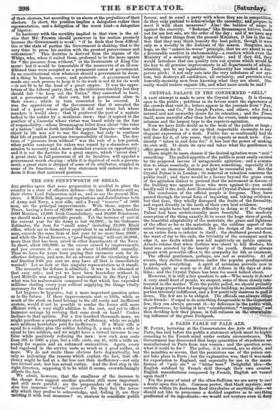CRYSTAL : PALACE IN THE CONDEMNED " SELL"
A LAST attempt is made to save the Crystal Palace. It is thrown open to the public ; petitions in its favour court the signatures of the crowds that visit it ; letters appear in the journals from " Fox, Henderson, and Co.," Sir Joseph Paxton, and others, who feel a natural and not unworthy desire for its retention ; and the Times itself, more merciful after than before the event, lends conspicuous columns and the largest type to the reprieve-agitation.
Now we have little doubt as to the wish of the public at large ; but the difficulty is to stir up that respectable enormity to any eloquent expression of a wish. Public has so continually had its will done for it, of late years, that it expects as much now.. Con- stantly 6' taken in and done for," it has lost the power of _making its own will. It shuts its eyes and takes what the gentlethen in offiee,Fovide for it. There might be more chance if the desired agitation were "anti " something. The palled appetite of the public is most easily excited by the peppered savour of antagonistic agitation; and a comma tion to abuse somebody, or to put down something, especially if it were at an immense distance, might be successful yet. But the Crystal Palace is in London; its removal or retention concerns the public itself ; and there would be a licence beyond the grace even
i
of the agitation dialect to pretend that the movement in favour of the building was against those who were against it—you could hardly call it the Anti-Anti-Retention-of-Crystal-Palace movement.
The conclusion. of the official people is foregone. They have passed through the usual form of inquiring and taking evidence; but that done, they wholly disregard the fruits of the formality, and report directly in the teeth of their own best evidence.
They might have-had more difficulty in doing so if the Crystal Palace had been architecturally more beautiful. The masterly conceptiOn of the thing exactly fit to cover the huge store of goods, the beautiful adaptability of the materials, the grace and lightness of the effect so far as the materials go, the sublime aspect of the raised transept, are undeniable. But the design of the structure as an entire form is inferior to itself : the shuttered ground-floor, the want of tag to the ends, the triviality of the ornament used to edge it, are faults which now tell negatively on public opinion. Ariosto relates that when Zerbino was about to kill Medoro, his hand was arrested by the beauty of the youth. Beauty always appeals with powerful effect to the sympathy for life or existence.
The official gentlemen, perhaps, are not so sensitive. At all events, they shelter themselves under the popular predisposition to poohpooh everything. A spirit of ostracism prevails now in London, quite as much as it did at Athens in the days of Aris- tides ; and the Crystal Palace has been too much talked about.
However, it hi still a fair question to ask—Who wants it down? A very small knot of people, we suspect, some of them closely bite- terested in the matter. Were the public polled, we should probably find a large proportion for keeping up the building, no inconsiderable portion intensely indifferent, and a few positively desirous to pull it down. The few are to be obliged. The officials can always oblige their friends : if urged to do something disagreeable to the important few, they can always prevent it—by deference to the public wish, in professions; • by taking it into "consideration," "inquiring," and then deciding how they please, in full reliance on the overwhelm- ing influence of the great Poohpooh.


























 Previous page
Previous page